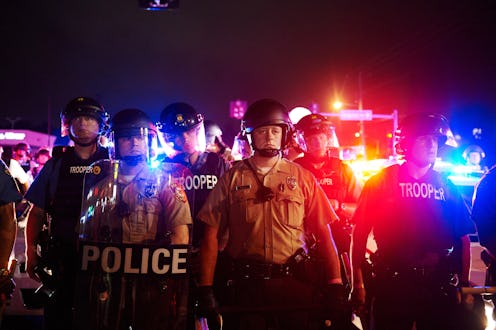News
2016 Candidates Talk Ferguson
Aug. 9 marked one year since unarmed black teenager Michael Brown was killed by a white police officer in Ferguson, Missouri. His death spurred a necessary long-term conversation about police violence and racism in the United States, and with the 2016 presidential election gearing up, racial issues have become an important topic for candidates to address. What do the 2016 candidates have to say about Ferguson?
On Sunday, the anniversary in Ferguson was commemorated at first peacefully. According to CNN, vigils were held with a four and a half minute silence to represent the four and half hours Brown's body laid in the street. But on Sunday night, reports came in as protesters threw rocks and bottles at police, and police claim that a man fired at them. The St. Louis County Police Department said at least two people near the protests fired guns Sunday night. Police said their unmarked car was fired upon, so the police fired back and a foot chase ensued, which culminated in the police shooting suspected gunman Tyrone Harris, Jr., who was taken to the hospital in critical condition. Details are continuing to emerge about Sunday's events.
A year later, Brown's death and police violence remain an issue. What did 2016 presidential candidates have to say about the Ferguson anniversary?
Hillary Clinton
Clinton has been outspoken about race in her campaign so far. The Democratic favorite made her first public comments late last August — interestingly more than two weeks after Michael Brown's death — in a San Francisco speech, saying, "Nobody wants to see our streets look like a war zone. Not in America, we are better than that." She continued, "We can't ignore the inequities that persist in our justice system that undermine our most deeply held values of fairness and equality." On Monday, Clinton paid respects to Brown's death with a tweet and continues to address race in her campaign.
Bernie Sanders
The Vermont senator and Democratic underdog Bernie Sanders has not explicitly said anything on his Twitter or Facebook. But, on Sunday, he released a comprehensive plan to combat racial justice plan on his website. His plan details how he would address physical, political, legal, and economic violence.
Martin O'Malley
The former Maryland governor has received some criticism for saying, "All lives matter" during Netroots Nation. (He has since apologized.) His tweet used the events in Ferguson to bring up his policy for criminal justice reform — detailed on his website — calls for more transparency, accountability, and fairness.
Donald Trump
Trump hasn't addressed the anniversary on his Twitter or Facebook pages — or much less said much about Michael Brown or police violence at all. If you're curious though, he didn't exactly have the nicest things to say about the recent Baltimore protests.
Scott Walker
A reporter approached Walker in South Carolina on Sunday, asking about the anniversary of Michael Brown's death. Walker said, "One, I think in general if anyone focuses on racial discord, we're going to get more. If we focus on unity, we’re going to get more of that." Yes, because not focusing on the problem usually solves it. The Huffington Post reported that Walker then went on to cite Charleston as an example of this approach: "Even days after the horrific shooting, the emotion they showed, the willingness to try and bring Charleston, this state, this country together. I think it’s a prime example if we focus on things that unite us, ways to share the American dream."
Jeb Bush
What has the Republican presidential hopeful said on the subject? So far, there's been nothing on Bush's Twitter page or his Facebook page. In June, he fielded questions from the press after speaking to a South Carolina pharmaceutical company, and when asked about what was behind the Ferguson and Baltimore protests Bush pointed to lack of mentoring. "Kids in this country are aimlessly wandering around in their lives because they’ve never been told they were capable of learning," Bush said. "They've never really had the kind of mentoring and nurturing that gives them the sense their lives could be better. You see what happens in Baltimore and Ferguson. You see the tragedies play out. You see people becoming so despondent they take actions that are horrific."
